King Fahd University of Petroleum & Minerals
College of Computer Sciences and Engineering
ICS 202:
Data Structures
(3-3-4)
Spring
Semester 2008-2009 (082)
<<
Syllabus >>
N.B. All course material and related resources are made available
through
WebCT and will be added here soon.
Office:
22-108
Phone: 03-860-1930,
E-mail:
alfy@kfupm.edu.sa,
URL:
http://faculty.kfupm.edu.sa/ics/alfy/
Office Hours:
SMW @
09:00am-10:00am or by appointment
|
Office:
22:108 Telephone: 1930
E-mail:
alfy@kfupm.edu.sa
|
Office:
22:148-2 Telephone: 2081
E-mail:
said@kfupm.edu.sa
Office
Hours:
UMT 1:00-2:00pm or by appointment |
|
Office:
22:101 Telephone: 7699
E-mail:
hamdi@kfupm.edu.sa
Office
Hours:
SMW 10:00-11:00AM or by appointment |
Office:
22:313 Telephone: 1715
E-mail:
wasfi@kfupm.edu.sa
Office
Hours:
SMW 11:00AM-1:00PM or by appointment |
Introduction to Design Patterns. Introduction
to Algorithm Analysis. Review and Analysis of Linear Data Structures.
Recursion, Trees and Graphs. Implementations of Tree and Graph
Traversals. BST, AVL, Heaps and B-Trees. Hashing Techniques. Data
Compression. Memory Management. Practice in Developing Medium Scale
Programs.
-
Introduce students to fundamental data
structures; their algorithms, implementations and applications.
-
Teach students how to analyze the efficiency
of the fundamental data structures in terms of both time and space so
that they are able to decide what data structure is suitable for a given
problem.
Upon
completion of the course, you should be able to:
- Apply object oriented
concepts (inheritance, polymorphism, design patterns, etc.) in software
design.
- Implement various data
structures and their algorithms, and apply them in implementing simple
applications.
- Analyze simple
algorithms and determine their efficiency using big-O notation.
- Apply the knowledge of
data structures to other application domains like data compression and
memory management.
|
Activity |
Weight |
|
Laboratory |
20% (see
Lab Guidelines) |
|
Homework
(4 to 5) [common] |
10% |
|
Quizzes
(4 to 5) |
10% |
|
EXAM 1:
Wednesday April 8, 2009, 7:00-9:00pm [common] |
15% |
|
EXAM 2:
Wednesday May 27, 2009, 7:00-9:00pm [common] |
20% |
|
Final
Exam: Sunday June 21, 2009, 7:30am [common] |
25% |
Note:
Material will be updated as necessary.
-
J2SE6 Documentation
-
JCreator
-
JGrasp
-
JEdit
-
SmartDraw
-
Homework assignments
-
Quizzes
-
Course Website.
Students are required to periodically check the course website and
download course materials as needed. Lecture notes will be made
available ahead of time for students to read, print out, and bring to
class. It is much easier to take additional notes this way, and gain the
most out of class. Several resources will be posted through the website
as well. Keys to quizzes and exams are generally discussed during class
as time permits but solutions will not be posted.
WebCT
will be used for communication and interaction, posting and submitting
assignments, posting grades, posting sample exams, etc. Also it is
expected that you get benefit of the discussion board by raising
questions or answering questions put by others.
-
Check the WebCT course
page and the ICS 202 Webpage regularly for announcements and updates.
-
Attendance (for lecture
part only): It
is very important to attend all classes. Attendance will be checked
at the beginning of each class. More than 9 lectures will result
automatically in a DN
grade without prior warning. To avoid being considered as absent, an
official excuse (ONLY
by an official letter from the Dean of Student’s office) must be shown no later than one week of return to class.
There is no penalty for the first two absences, after that you lose one
full percentage per absence.
-
Homework submission:
Hard copies of homework are due at the beginning of the first class
after the electronic submission deadline. No late homework will be
accepted. Discussing questions among your classmates and on WebCT is
highly encouraged. Copying homework solutions from each other is NOT
permitted and will be considered CHEATING.
-
Class participation:
Students are expected to be active and collaborative in the discussion
of the topics. Homework assignments are given for you for practice but
it is expected that you hand in a typed solution before or on the due
date. You will not do well in the quizzes and exams if you do not do
the homework assignments.
-
Exams, homework assignments and
quizzes are generally CHALLENGING. No make up
quizzes or exams will be given.
-
Re-grading policy:
if you have a complaint about any of your grades, discuss it with the
instructor no later than a week of distributing the grades (except for
the final). If for some reason you cannot contact the instructor within
this period, send him an email requesting an appointment. The email
should be sent within the 24-hour time period. Only legitimate concerns on grading should be
discussed.
-
Office Hours.
Students are encouraged to use the office hours to clarify any
part of the material that is not clear; however the instructor will only
provide hints if it is an assigned task but not solve it.
-
Academic honesty:
Students are expected to abide by all the university regulations on
academic honesty. Cheating will be reported to the Department Chairman
and will be severely penalized. Although collaboration and sharing
knowledge is highly encouraged, copying others’ work without proper
citation, either in part or full, is considered plagiarism. Whenever in
doubt, review the university guidelines or consult the instructor.
-
Courtesy: Students
are expected to be courteous toward the instructors and their
classmates throughout the duration of this course. Talking while someone
else is speaking will not be tolerated. Furthermore, all cell phones
must be turned off during class and exams. In addition, students are expected to
be in class on time. Late arrivals will disrupt the class session. If
you are 15 minutes late, you will be marked as absent and will not be
permitted to enter the class. More importantly, you are not allowed to
leave the class unless it is of an urgent matter. To contact me, please
use email through WebCT whenever possible and avoid using phone calls
or written notes. When necessary to send an email through the
university email system, please indicate ICS202-073 in the "Subject" field
of your email, e.g. ICS202-073: Question about HW1.
Lab Guidelines:
For the Labs,
you must store all your work in a package ics202 on your z-drive. We shall
be adding files to this package in each lab. Your lab exercises should be
stored in sub-packages lab01, lab02, etc. You are required to observe this
package structure throughout the semester.
1.
Grade Distribution:
·
6 % Participation (0.5% * 12)
·
14 % Four Laboratory Quizzes (3% + 3% + 4% + 4%)
(a) There
will be no make-up for missed laboratory quizzes.
(b) A
student will not be allowed to take a laboratory quiz in a different
section; unless permitted by the laboratory instructor to do so.
(c) Being
able to configure the Software used in the lab, being able to fix the common
ICS 202 laboratory errors (as explained in Laboratory session 0), and making
sure a student’s Z drive is properly configured (before coming for a quiz)
is considered part of a quiz.
(d) Each
laboratory quiz will be an open-book programming quiz.
(e) A student
will be given zero in a quiz if he misses a lab quiz in his section without
an official excuse or if he copies even a small portion of his quiz from
another student. All students involved in a cheating offence will get a zero
grade. It is a student’s responsibility to protect his work.
(f) A student
will be given a grade of zero (out of 0.5) for the participation part of the
laboratory if he does any of the following:
(1) He is
absent without an official excuse (2) He is late by more than 15 minutes (3)
He does not come back promptly to the lab after a prayer break (4) He
leaves the laboratory session without the instructors permission (5) He
does not attempt to do the current laboratory tasks (6) He does anything
not related to the current laboratory session, like connecting to a Web site
other than the ICS 202 WebCT site without the instructor’s permission, or
reading other material. A STUDENT MUST BE DOING THE LABORATORY TASKS EVEN IF
THE LABORATORY INSTRUCTOR IS LATE OR HE IS NOT PRESENT IN THE LAB (7) He
does not pay attention when the instructor is explaining something (8) He
disrupts the laboratory session. Discussions are allowed (except during a
quiz); but they must be done in a manner that does not disturb other
students. A STUDENT IS REQUIRED TO PUT HIS MOBILE PHONE IN SILENT MODE
DURING THE LABORATORY SESSIONS.
2.
Announcement of Laboratory quizzes: The dates and the topics that will
be covered in each quiz are in the course syllabus. You are required to know
these dates. Students may or may not be reminded about the quizzes.
3.
Preparation for each laboratory session: A student is required to
prepare himself for a laboratory session by reading the laboratory document
for that session, by studying the code, and by reading all lecture material
related to the session. THIS PREPARATION IS ESSENTIAL FOR A STUDENT TO BE
ABLE TO DO THE LABORATORY TASKS. The lab instructor will not conduct
lectures; he may just elaborate on specific issues related to the current
lab session.
4.
Laboratory Quiz solutions will be discussed in the appropriate
laboratory sessions. Solutions will not be posted. This is to encourage
student participation.
5.
Complaints regarding Laboratory quiz grades must be submitted to the
laboratory instructor within one week of the posting of the grades for that
particular quiz.
6.
Laboratory Instructor’s Office Hours: Students are encouraged to use the
office hours to clarify any part of the laboratory tasks that is not clear;
however the instructor will only provide hints and not solve a task.
7. Some
aspects of the laboratory tasks may be asked in the ICS 202 major exams and
the final exam. Students are thus required to take the laboratory part
of this course seriously.
888
Best of luck!!
888
- Additional Recommended Readings
(with Focus on Data Structures & Java)
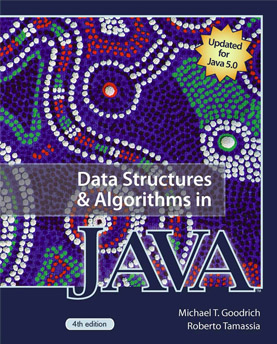
Data Structures and
Algorithms in Java, 4th edition,
Michael T. Goodrich and Roberto
Tamassia,
John Wiley & Sons, 2006.
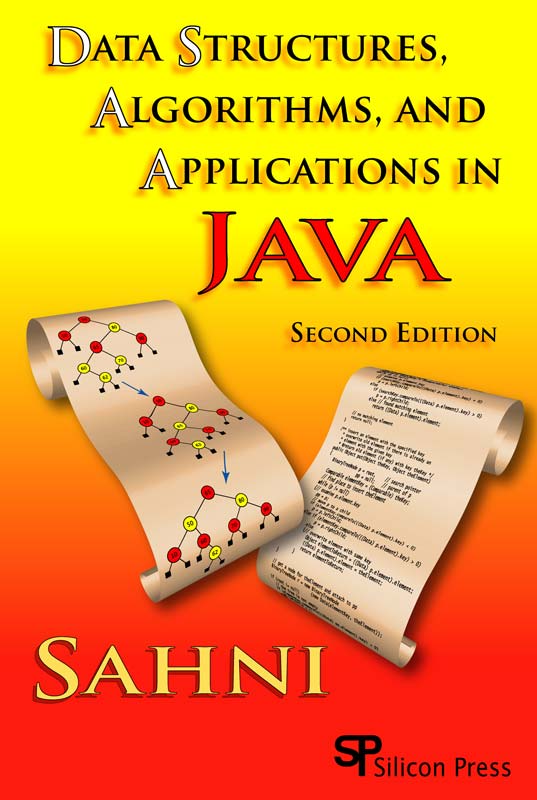 Data
Structures, Algorithms, and Applications in Java, 2nd edition,
Data
Structures, Algorithms, and Applications in Java, 2nd edition,
Sartaj Sahni,
Silicon Press, 2004.
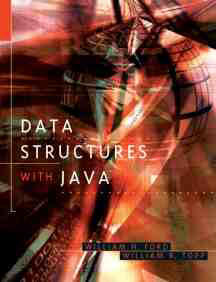 Data
Structures with Java,
Data
Structures with Java,
William H. Ford and William R. Topp,
Prentice Hall, 2005.
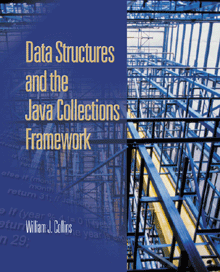 Data
Structures and the Java Collections Framework, 2nd edition,
Data
Structures and the Java Collections Framework, 2nd edition,
William Collins,
McGraw-Hill, 2005.

Object-oriented Data Structures
Using Java, 2nd edition,
N. Dale, D. Joyce, C. Weems,
Jones and Bartlett, 2006.
 Data
Structures and Algorithms in Java
Data
Structures and Algorithms in Java
Peter Drake,
Prentice-Hall, 2006.
 Data
Structures & Other Objects Using Java, 3rd edition,
Data
Structures & Other Objects Using Java, 3rd edition,
Michael Main,
Addison-Wesley, 2006.
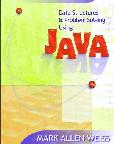 Data
Structures and Problem Solving Using Java, 2nd edition
Data
Structures and Problem Solving Using Java, 2nd edition
Mark Allen Weiss,
Addison-Wesley, 2001.
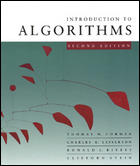 Introduction
to Algorithms and Java CD-ROM,
Introduction
to Algorithms and Java CD-ROM,
Thomas H Cormen, Charles E Leiserson,
Ronald L Rivest, Clifford Stein
Mc-Graw Hill, 2003
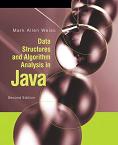
Data Structures and Algorithm Analysis in Java, 2nd edition,
Mark Allen Weiss
Addison-Wesley, 2007


Algorithms in Java, Parts 1-4
(Fundamental Algorithms, Data Structures, Sorting, Searching), 2002
Algorithms in Java, Part 5 (Graph
Algorithms), 2003
Robert Sedgewick
Others
 Algorithms:
Design Techniques and Analysis
Algorithms:
Design Techniques and Analysis
M. H. Alsuwaiyel
World Scientific Publishing Company, 1998
The Algorithm Design Manual, 2nd
edition,
Steven S. Skiena
Springer, 2008
 Data
Structures and Algorithms
Data
Structures and Algorithms
Alfred V. Aho, John E. Hopcroft,
Jeffrey Ullman
Addison-Wesley, 1982
Fundamentals of Computer Algorithms
Ellis Horowitz
Data Structure Techniques
Thomas A. Standish
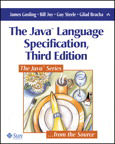 The
Java Language Specification, Third Edition, Sun Microsystems, Inc. 2005
The
Java Language Specification, Third Edition, Sun Microsystems, Inc. 2005
James Gosling
Bill Joy
Guy Steele
Gilad Bracha
 The Design
Patterns Java Companion, 1998 [online] [pdf]
The Design
Patterns Java Companion, 1998 [online] [pdf]
James W. Cooper
- Additional Resources on the Web
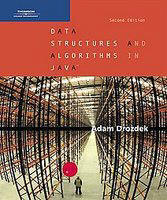 Data
Structures and Algorithms in Java, 2nd Edition,
Data
Structures and Algorithms in Java, 2nd Edition, 

 Data
Structures, Algorithms, and Applications in Java, 2nd edition,
Data
Structures, Algorithms, and Applications in Java, 2nd edition,
 Data
Structures and the Java Collections Framework, 2nd edition,
Data
Structures and the Java Collections Framework, 2nd edition,


 Data
Structures and Problem Solving Using Java,
Data
Structures and Problem Solving Using Java, 



 Algorithms:
Design Techniques and Analysis
Algorithms:
Design Techniques and Analysis 
 The
Java Language Specification, Third Edition, Sun Microsystems, Inc. 2005
The
Java Language Specification, Third Edition, Sun Microsystems, Inc. 2005